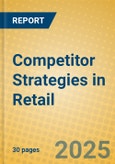The Competitor Strategies in Retail global briefing offers an insight into the size and shape of the retailing industry, highlights emerging trends, their effects on retailing in markets around the world, on the development of channels and consumers’ shopping patterns. It identifies the leading companies and brands, offers strategic analysis of key factors influencing the market - be they the developments of new store types, the importance of non-store retailing, economic/lifestyle influences, private label or pricing issues. Forecasts illustrate how the market is set to change and criteria for success.
Product coverage: Retail E-Commerce, Retail Offline.
Data coverage: Market sizes (historic and forecasts), company shares, brand shares and distribution data.
Why buy this report?
- Get a detailed picture of the Retail market;
- Pinpoint growth sectors and identify factors driving change;
- Understand the competitive environment, the market’s major players and leading brands;
- Use five-year forecasts to assess how the market is predicted to develop.
Table of Contents
- Introduction
- Overview
- Strategies in retail
- Conclusion
- conclusion
- Appendix
- Conclusion/Appendix
Companies Mentioned (Partial List)
A selection of companies mentioned in this report includes, but is not limited to:
- IKEA
- Lidl
- Zabka Nano
- Walmart Connect
- Flipkart








